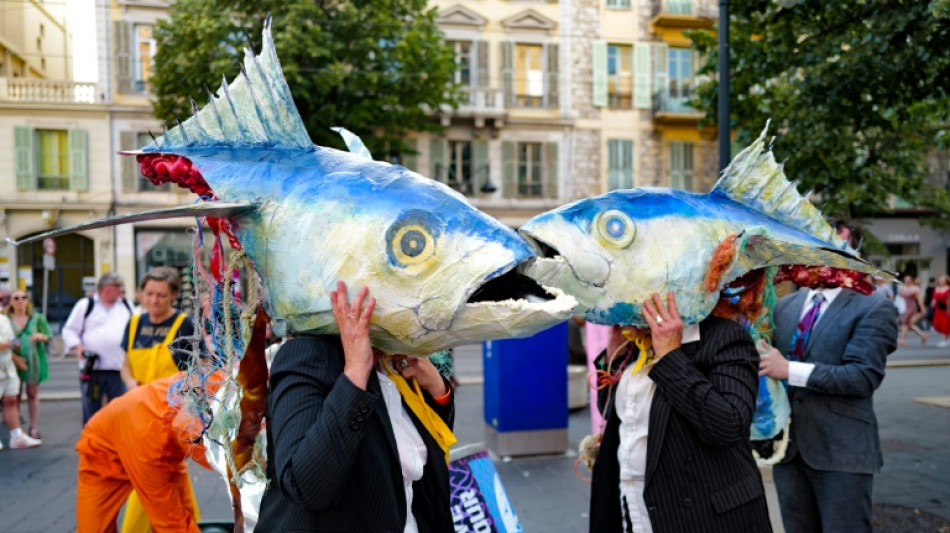
-
 Dollar rebounds while gold climbs again before Fed update
Dollar rebounds while gold climbs again before Fed update
-
Aki a doubt for Ireland's Six Nations opener over disciplinary issue

-
 West Ham sign Fulham winger Traore
West Ham sign Fulham winger Traore
-
Relentless Sinner sets up Australian Open blockbuster with Djokovic

-
 Israel prepares to bury last Gaza hostage
Israel prepares to bury last Gaza hostage
-
Iran rejects talks with US amid military 'threats'

-
 Heart attack ends iconic French prop Atonio's career
Heart attack ends iconic French prop Atonio's career
-
SKorean chip giant SK hynix posts record operating profit for 2025

-
 Greenland's elite dogsled unit patrols desolate, icy Arctic
Greenland's elite dogsled unit patrols desolate, icy Arctic
-
Dutch tech giant ASML posts bumper profits, cuts jobs

-
 Musetti rues 'really painful' retirement after schooling Djokovic
Musetti rues 'really painful' retirement after schooling Djokovic
-
Russian volcano puts on display in latest eruption

-
 Thailand uses contraceptive vaccine to limit wild elephant births
Thailand uses contraceptive vaccine to limit wild elephant births
-
Djokovic gets lucky to join Pegula, Rybakina in Melbourne semi-finals

-
 Trump says to 'de-escalate' Minneapolis, as aide questions agents' 'protocol'
Trump says to 'de-escalate' Minneapolis, as aide questions agents' 'protocol'
-
'Extremely lucky' Djokovic into Melbourne semi-finals as Musetti retires

-
 'Animals in a zoo': Players back Gauff call for more privacy
'Animals in a zoo': Players back Gauff call for more privacy
-
Starmer heads to China to defend 'pragmatic' partnership

-
 Uganda's Quidditch players with global dreams
Uganda's Quidditch players with global dreams
-
'Hard to survive': Kyiv's elderly shiver after Russian attacks on power and heat

-
 South Korea's ex-first lady jailed for 20 months for taking bribes
South Korea's ex-first lady jailed for 20 months for taking bribes
-
Polish migrants return home to a changed country

-
 Dutch tech giant ASML posts bumper profits, eyes bright AI future
Dutch tech giant ASML posts bumper profits, eyes bright AI future
-
South Korea's ex-first lady jailed for 20 months for corruption

-
 Minnesota congresswoman unbowed after attacked with liquid
Minnesota congresswoman unbowed after attacked with liquid
-
Backlash as Australia kills dingoes after backpacker death

-
 Brazil declares acai a national fruit to ward off 'biopiracy'
Brazil declares acai a national fruit to ward off 'biopiracy'
-
Anisimova 'loses her mind' after Melbourne quarter-final exit

-
 Home hope Goggia on medal mission at Milan-Cortina Winter Olympics
Home hope Goggia on medal mission at Milan-Cortina Winter Olympics
-
Omar attacked in Minneapolis after Trump vows to 'de-escalate'

-
 Pistons escape Nuggets rally, Thunder roll Pelicans
Pistons escape Nuggets rally, Thunder roll Pelicans
-
Dominant Pegula sets up Australian Open semi-final against Rybakina

-
 'Animals in a zoo': Swiatek backs Gauff call for more privacy
'Animals in a zoo': Swiatek backs Gauff call for more privacy
-
Japan PM's tax giveaway roils markets and worries voters

-
 Amid Ukraine war fallout, fearful Chechen women seek escape route
Amid Ukraine war fallout, fearful Chechen women seek escape route
-
Rybakina surges into Melbourne semis as Djokovic takes centre stage

-
 Dollar struggles to recover from losses after Trump comments
Dollar struggles to recover from losses after Trump comments
-
Greenland blues to Delhi red carpet: EU finds solace in India

-
 Will the EU ban social media for children in 2026?
Will the EU ban social media for children in 2026?
-
Netherlands faces 'test case' climate verdict over Caribbean island

-
 Rybakina stuns Swiatek to reach Australian Open semi-finals
Rybakina stuns Swiatek to reach Australian Open semi-finals
-
US ouster of Maduro nightmare scenario for Kim: N. Korean ex-diplomat

-
 Svitolina credits mental health break for reaching Melbourne semis
Svitolina credits mental health break for reaching Melbourne semis
-
Japan's Olympic ice icons inspire new skating generation

-
 Safe nowhere: massacre at Mexico football field sows despair
Safe nowhere: massacre at Mexico football field sows despair
-
North Korea to soon unveil 'next-stage' nuclear plans, Kim says

-
 French ex-senator found guilty of drugging lawmaker
French ex-senator found guilty of drugging lawmaker
-
US Fed set to pause rate cuts as it defies Trump pressure

-
 Sleeping with one eye open: Venezuelans reel from US strikes
Sleeping with one eye open: Venezuelans reel from US strikes
-
Venezuela's acting president says US unfreezing sanctioned funds


Nations advance ocean protection, vow to defend seabed
A global oceans summit wrapped up Friday with world leaders taking major steps toward marine protection and vowing a showdown when nations meet to negotiate rules for deep-sea mining next month.
But as a cacophony of ship foghorns sounded the close of the UN Ocean Conference in France, a lack of funding pledges and the total omission of fossil fuels disappointed some observers.
The summit was just the third -- and largest yet -- dedicated entirely to what the United Nations calls an "emergency" in the world's oceans.
More than 60 heads of state and government joined thousands of business leaders, scientists and environmental campaigners over five days in the southern city of Nice.
- Treaty tide -
There was unanimous praise for efforts to ratify the high seas treaty designed to protect marine life in the 60 percent of oceans that lie beyond national waters.
Some 19 countries formally ratified the pact at Nice, taking the overall tally to 50 -- but 60 nations are needed to bring the treaty into force.
France's oceans envoy, Olivier Poivre d'Arvor, said the numbers would be reached by September and the treaty should take effect by January, 2026.
Rebecca Hubbard, director of the High Seas Alliance, welcomed the "incredible progress" but urged "all remaining nations to ratify without delay".
The summit sought a collective lift for oceans even as countries brace for tough talks over deep-sea mining in July and a plastic pollution treaty in August.
More than 90 ministers called in Nice for the treaty to enshrine limits on plastic production -- something fiercely opposed by oil-producing nations.
The summit also rallied behind a defence of science and rules-based oversight of common resources -- most notably the unknown depths of the oceans -- in a direct rebuke of US President Donald Trump.
Trump was not present in Nice and rarely mentioned by name, but his shadow loomed as leaders thundered against his unilateral push to mine the ocean floor for nickel and minerals.
- Seabed row -
France and like-minded countries vowed to block any effort to permit deep-sea exploration at negotiations over a mining code at the International Seabed Authority next month, said Poivre d'Arvor.
"Nobody knows what is there in the deep sea... you cannot launch recklessly down this path," he said in a closing address.
UN Secretary-General Antonio Guterres urged caution, warning against turning the deep sea into "the wild west".
Leaders "made it unmistakably clear: deep-sea mining is one of the biggest threats facing our ocean, and the world is saying no", said Sofia Tsenikli from the Deep Sea Conservation Coalition.
But for all the rhetoric, a global alliance opposed to deep-sea mining only attracted four new members at Nice, rising to 37 nations.
- Missing billions -
Greece, Samoa and Colombia were among 14 nations who unveiled plans for vast new marine protected areas, taking the share of the world's oceans under conservation to more than 10 percent.
Some also announced restrictions on bottom trawling, a destructive fishing method captured in grisly detail in a new David Attenborough documentary.
Activists had pushed for a total ban on this kind of trawling, which uses heavy weighted nets dragged across the ocean floor.
Developing nations hoping their larger and wealthier counterparts would open the chequebook in Nice were disappointed.
Small island nations in particular have long complained they lack the finances required to build seawalls against rising tides and protect their waters from illegal fishers.
While private donors pledged around 8.7 billion euros ($10 billion) over the next five years, the UN says $175 billion a year is needed for sustainable ocean development.
Fossil fuels -- the main driver of climate change, ocean warming and the acidification of the seas -- were notably absent for a summit dedicated to marine protection.
"Ignoring the imperative of phasing out offshore oil and gas is not just an injustice: it is inadmissible," said Bruna Campos from the Center for International Environmental Law.
The summit closed with the unanimous adoption of a political statement, negotiated over many months, that contained no mention of coal, oil and gas.
"We must all reckon with the reality that you cannot protect the ocean without confronting the biggest root cause bringing it to the breaking point," former US special climate envoy John Kerry said in a statement.
H.Kuenzler--VB



